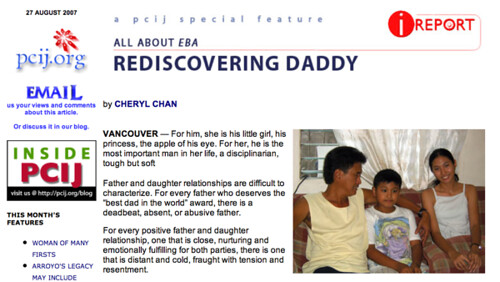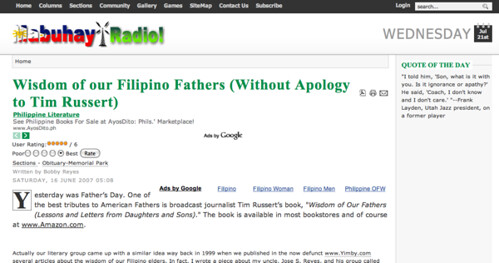A study done in the Philippines by a US-based researcher appears to have validated that assertion.
Exploring the Role of Filipino Fathers: Paternal Behaviors and Child Outcomes
Scott E. Harper, Oklahoma Christian University, Oklahoma City, scott.harper@oc.edu
Abstract
Using data collected from an urban Southern Visayan province during the Summer of 2006, this study examines a sample of 133 Filipino fathers to consider potential relationships between father behaviors and child outcomes. Increased paternal psychological control predicts increased problematic child outcomes, with sons being more affected than daughters. Furthermore, increased authoritative fathering is associated with decreased externalizing problems of children as well as fewer internalizing problems for sons but not for daughters. Increased father involvement predicts improved sibling relationship quality for children. Other factors predicting problematic child outcomes in the overall regression model include father education and number of children in the household. Overall, findings support the idea that Filipino fathers play a valuable role in the lives of their children.
Source: http://jfi.sagepub.com/content/31/1/66.short
I like the last sentence of the Abstract: "Overall, findings support the idea that Filipino fathers play a valuable role in the lives of their children." Too bad I am unable to get, at this time, the full text of the study. Hopefully soon. Anyhow, at this time, I am already happy with what the Abstract is saying.
I'd like to feature at least three sites that seem to support that notion about Filipino fathers:
I like the way the blog author reminisces about her father. I am also impressed by the way the father imbibed in her Filipino values, even while growing up and living in foreign lands.
My father teachings:
- Respect your elders
- eat only what you can just think about those children who don’t have anything to eat
- Study hard
- he hates young people who flirts at a very young age so we have to focus on our friends and studying (luckily there was no internet and cellphone at that time)
- Although he doesn’t regularly go to church it’s my mother who is so religious he still encourage us to go to church on Sundays.
- be kind and helpful to the needy.
- don’t lie or steal
- an there’s a lot more
This is a full-blown journalistic article that talks about how Filipino families have discovered (or "rediscovered") the "nurturing side" of their fathers when they moved abroad. The article cites an example of a family that immigrated to Canada, where the father began spending more time at home.
Just like elsewhere in the world, Filipino fathers are seen as the family breadwinner and provider, with female interviewees often describing their own dads as strict but kind, fair but a disciplinarian. But Pinoy fathers are also said to be a little bit more nurturing than those in other cultures, especially when it comes to dealing with daughters, of whom they are often very protective. And while circumstances such as a busy work schedule may sometimes “bury” that nurturing side of the typical tatay, the lack of the usual support systems in a strange, new place can bring the doting father back to fore.
The third site hosts testimonies of people about their fathers. I myself picked up some words of wisdom from my father, which still ring in my ears even after 12 years since he passed away. The words are, "Do not be ashamed, do not be afraid, do not be discouraged." You can read words of wisdom from other fathers, as posted by their sons, in this site.
My father, Dominador S. Reyes (1909-2000), gave this advice, "A thing is good only when it can be had." I will eventually post my eulogy to him in this website. xxx Then there was the favorite adage of my now-deceased father-in-law, Estanislao "Vigan" de los Reyes, the youngest son of the late Isabelo "Don Belong" de los Reyes. Papa Vigan said, "Nobody can put a good man down."
Valuable indeed are the roles of fathers, whether they are in the Philippines or in other countries. It is a role that inherently suffers from lack of appreciation for the reason that fathers do things for their families whether they get appreciated or not.
Accomplishing the mission is its own reward. Let all the challenges--including the lack of recognition--be integral parts of the adventure that we go through in life as men, as husbands and as fathers.
![Fatherhood [dot] Win](https://blogger.googleusercontent.com/img/b/R29vZ2xl/AVvXsEglrMBIGm4eZM1Vp1j57WwcHPaEDC47d_HNrwwoDqH6BSu9JfAD1jgk-eYZLnuVuSc7RknZ_t_d4cd5_MbIbxEeJdzpX30FTWTb02kGZbR4VcH3eJVNIU1f5hxXF9CFY-DwyvvPf7gXCTY/s880/Blog+Header+Design+v2.png)



No comments:
Post a Comment